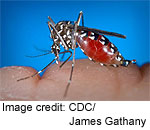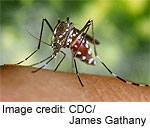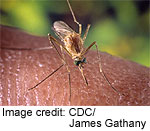Neuroscience For Kids
Bug Off!
 Natural chemicals identified to repel mosquitoes
Natural chemicals identified to repel mosquitoes
August 11, 2010
Effective and safe mosquito repellants that do not hurt the environment would be a welcome addition in the battle against diseases such as malaria, West Nile virus, encephalitis and yellow fever. Researchers may have found such a weapon that is produced by an insect called the backswimmer (Notonecta maculata).
 Backswimmers like to eat mosquitoes. Scientists have known that
mosquitoes avoid water where backswimmers live and mosquitoes will not lay
their eggs in this water. However, the chemicals produced by backswimmers
and detected by mosquitoes had not been identified until now. The
researchers identified two chemicals (n-heneicosane and
n-tricosane) in air samples collected directly over water where
backswimmers lived and tested these chemicals for their ability in
reducing egg laying by mosquitoes.
Backswimmers like to eat mosquitoes. Scientists have known that
mosquitoes avoid water where backswimmers live and mosquitoes will not lay
their eggs in this water. However, the chemicals produced by backswimmers
and detected by mosquitoes had not been identified until now. The
researchers identified two chemicals (n-heneicosane and
n-tricosane) in air samples collected directly over water where
backswimmers lived and tested these chemicals for their ability in
reducing egg laying by mosquitoes.
 Water treated with n-heneicosane and n-tricosane
reduced mosquito egg laying by 65% on the first night.
Water samples where backswimmers lived reduced mosquito egg laying by a
similar amount. Although backswimmer water was effective for several
days, water treated with n-heneicosane and n-tricosane did
not prevent egg laying on the second day of testing.
Water treated with n-heneicosane and n-tricosane
reduced mosquito egg laying by 65% on the first night.
Water samples where backswimmers lived reduced mosquito egg laying by a
similar amount. Although backswimmer water was effective for several
days, water treated with n-heneicosane and n-tricosane did
not prevent egg laying on the second day of testing.
These data suggest that mosquitoes can detect chemicals released from backswimmers and will avoid laying their eggs in water containing these chemicals. Mosquitoes that avoid this water will not get eaten by the backswimmers, but they will not lay their eggs in this water. Therefore, they might get eaten by other animals or die as they look for other places to lay their eggs.
References and more information:
- Silberbush, A., Markman, S., Lewinsohn, E., Bar, E., Cohen, J.E. and Blaustein L., Predator-released hydrocarbons repel oviposition by a mosquito, Ecology Letters, 2010, doi: 10.1111/j.1461-0248.2010.01501
Copyright © 1996-2010, Eric H. Chudler, University of Washington
